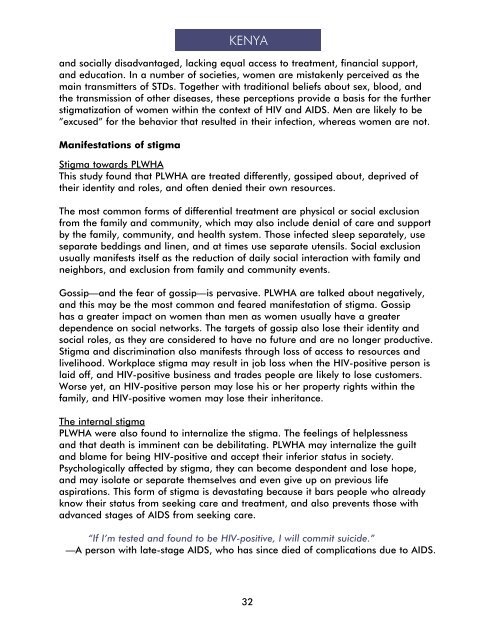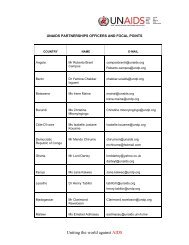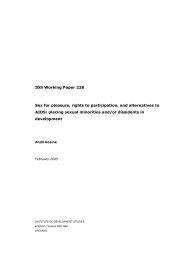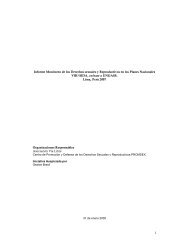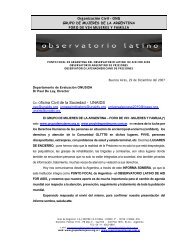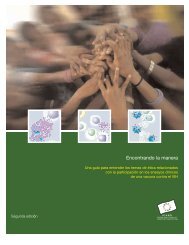a person with HIV will die very quickly, if not immediately. People with certainillnesses (such as TB and herpes zoster) are usually believed to have HIV, <strong>the</strong>reforeare also stigmatized. Fur<strong>the</strong>rmore, some respondents did not believe that OIs aretreatable or curable, and o<strong>the</strong>rs equated TB with <strong>AIDS</strong>. Cultural perceptions, suchas a belief that disease is caused by witchcraft, has also increased fears. Somerespondents expressed fear of physical contact with those infected.Respondents also expressed a strong fear of painful, certain death. Given thisprofound fear, people said <strong>the</strong>y tended to limit <strong>the</strong>ir contact with PLWHA.Sex and moralityBecause HIV is mainly sexually transmitted in Kenya—and because it is associatedwith promiscuity—HIV/<strong>AIDS</strong> is not thought of like o<strong>the</strong>r diseases. Studies reveala common belief that people with HIV acquired it through sexual activity that isnot socially sanctioned or goes against religious teachings. Hence, having HIVis considered to be a result of “deviant behavior,” and PLWHA are regarded asadulterers, prostitutes, and generally immoral or shameful. Therefore, PLWHA areblamed and stigmatized as irresponsible persons. Sex and HIV infection are alsooften associated with sin, with some people saying that HIV is a punishment fromGod for sexual sins committed by humanity at large, and individuals in particular.Those who get HIV are supposed to have sinned, while following strict religiousstrictures is believed to ward off illness.The context of stigmaKENYAThis study also found socioeconomic status, gender, and age also influence <strong>the</strong>stigma experienced by PLWHA and affect a person’s ability to cope with <strong>the</strong> stigma.The rich are believed to become infected because of promiscuous lives and <strong>the</strong>irability to buy sex from prostitutes, while <strong>the</strong> poor— especially women— are viewedto have become infected due to abject poverty that forces <strong>the</strong>m to accept riskysexual activities to earn a living. It is also believed that youth are at a higher risk forHIV infection due to <strong>the</strong>ir irresponsible and active sexual lives, and <strong>the</strong>y are typicallyblamed for becoming infected through promiscuous, immoral, and “improper”behavior.GenderWomen have a higher risk of infection than men, both for physiological reasonsand due to environmental factors such as sexual violence. However, men mayalso be considered to be at higher risk than women due to men’s polygamous orpromiscuous sexual lives; in Kenya, <strong>the</strong> culture allows men to be polygamous. Bothmen and women are stigmatized if infected by HIV, but stigma directed towardwomen is typically stronger.The impact of HIV/<strong>AIDS</strong> on women is overall more acute, and HIV-positive womenare treated very differently from men. In Kenya, women are economically, culturally,31
and socially disadvantaged, lacking equal access to treatment, financial support,and education. In a number of societies, women are mistakenly perceived as <strong>the</strong>main transmitters of STDs. Toge<strong>the</strong>r with traditional beliefs about sex, blood, and<strong>the</strong> transmission of o<strong>the</strong>r diseases, <strong>the</strong>se perceptions provide a basis for <strong>the</strong> fur<strong>the</strong>rstigmatization of women within <strong>the</strong> context of HIV and <strong>AIDS</strong>. Men are likely to be”excused” for <strong>the</strong> behavior that resulted in <strong>the</strong>ir infection, whereas women are not.Manifestations of stigmaKENYAStigma towards PLWHAThis study found that PLWHA are treated differently, gossiped about, deprived of<strong>the</strong>ir identity and roles, and often denied <strong>the</strong>ir own resources.The most common forms of differential treatment are physical or social exclusionfrom <strong>the</strong> family and community, which may also include denial of care and supportby <strong>the</strong> family, community, and health system. Those infected sleep separately, useseparate beddings and linen, and at times use separate utensils. Social exclusionusually manifests itself as <strong>the</strong> reduction of daily social interaction with family andneighbors, and exclusion from family and community events.Gossip—and <strong>the</strong> fear of gossip—is pervasive. PLWHA are talked about negatively,and this may be <strong>the</strong> most common and feared manifestation of stigma. Gossiphas a greater impact on women than men as women usually have a greaterdependence on social networks. The targets of gossip also lose <strong>the</strong>ir identity andsocial roles, as <strong>the</strong>y are considered to have no future and are no longer productive.Stigma and discrimination also manifests through loss of access to resources andlivelihood. Workplace stigma may result in job loss when <strong>the</strong> HIV-positive person islaid off, and HIV-positive business and trades people are likely to lose customers.Worse yet, an HIV-positive person may lose his or her property rights within <strong>the</strong>family, and HIV-positive women may lose <strong>the</strong>ir inheritance.The internal stigmaPLWHA were also found to internalize <strong>the</strong> stigma. The feelings of helplessnessand that death is imminent can be debilitating. PLWHA may internalize <strong>the</strong> guiltand blame for being HIV-positive and accept <strong>the</strong>ir inferior status in society.Psychologically affected by stigma, <strong>the</strong>y can become despondent and lose hope,and may isolate or separate <strong>the</strong>mselves and even give up on previous lifeaspirations. This form of stigma is devastating because it bars people who alreadyknow <strong>the</strong>ir status from seeking care and treatment, and also prevents those withadvanced stages of <strong>AIDS</strong> from seeking care.“If I’m tested and found to be HIV-positive, I will commit suicide.”—A person with late-stage <strong>AIDS</strong>, who has since died of complications due to <strong>AIDS</strong>.32
- Page 1 and 2: Missing the Target #5:Improving AID
- Page 4 and 5: ArgentinaDr. María Lorena Di Giano
- Page 8 and 9: Executive SummaryAt the G8 meeting
- Page 12: • UN agencies should provide incr
- Page 16 and 17: Price should not be a barrier when
- Page 18 and 19: The Global Fund and UNITAID: The Fu
- Page 20 and 21: The real cost of free treatmentBy a
- Page 22 and 23: Remaining work for asuccessful prog
- Page 24 and 25: DOMINICAN REPUBLICto access rapid t
- Page 26 and 27: DOMINICAN REPUBLICIn Santo Domingo
- Page 28 and 29: ZIMBABWEtreatment, representing 35
- Page 30 and 31: ZIMBABWEAccording to the Medicines
- Page 32 and 33: ZIMBABWEZimbabwe’s application fo
- Page 34 and 35: ZIMBABWENational government• Addr
- Page 36 and 37: RUSSIAMigrantsRussia, with the seco
- Page 40 and 41: FamiliesIn Kenya, families are the
- Page 42 and 43: INDIA2. Provide pediatric formulati
- Page 44 and 45: Linking nutrition and treatmentBy W
- Page 46 and 47: Most people living with advanced HI
- Page 48 and 49: only available in the capital, Yaou
- Page 50 and 51: ZAMBIAFindings in particular provin
- Page 52 and 53: The DACA for Chadiza District was a
- Page 54 and 55: Many health care workers are inadeq
- Page 56 and 57: DRUG REGISTRATION BARRIERS & LOGJAM
- Page 58 and 59: Country ATV RLPV/rLPV/r(HS)TDFArgen
- Page 60 and 61: development and registration. Likew
- Page 62 and 63: Capacity issues and delays in the W
- Page 64 and 65: Lack of post-approval quality assur
- Page 66 and 67: ARV PROCUREMENT, REGISTRATION,AND S
- Page 68 and 69: ARGENTINAParallel importingRelating
- Page 70 and 71: ARGENTINAAccess to ARVsNo difficult
- Page 72 and 73: Viral load tests are available, but
- Page 74 and 75: Cambodiaby Mony PenOnly pharmacists
- Page 76 and 77: ChinaBy anonymous Missing the Targe
- Page 78 and 79: CHINAThe current process for regist
- Page 80 and 81: Dominican RepublicBy Eugene Schiff
- Page 82 and 83: IndiaBy Abraham KK, Celina D’Cost
- Page 84 and 85: MalawiBy Lot Nyirenda and Grace Bon
- Page 86 and 87: MALAWIStock-outsAccording to an ext
- Page 88 and 89:
MoroccoBy Othman MelloukMorocco has
- Page 90 and 91:
Determine the patent status of all
- Page 92 and 93:
MOROCCOThe shortage occurred becaus
- Page 94 and 95:
As of November 2007, the unit cost
- Page 96 and 97:
NIGERIADiagnostic testsDiagnostic t
- Page 98 and 99:
The government’s initial inabilit
- Page 100 and 101:
Increase training and capacity buil
- Page 102 and 103:
treatment practice. The Minster ann
- Page 104 and 105:
Ugandaby Richard Hasunira, Prima Ka
- Page 106 and 107:
UGANDAExtracts from the MoH’s rep
- Page 108 and 109:
ZAMBIAIn gathering this information
- Page 110 and 111:
However, since manufacturing prices
- Page 112 and 113:
105SHORT SUMMARY
- Page 114:
PAKISTANAccess for marginalized gro


